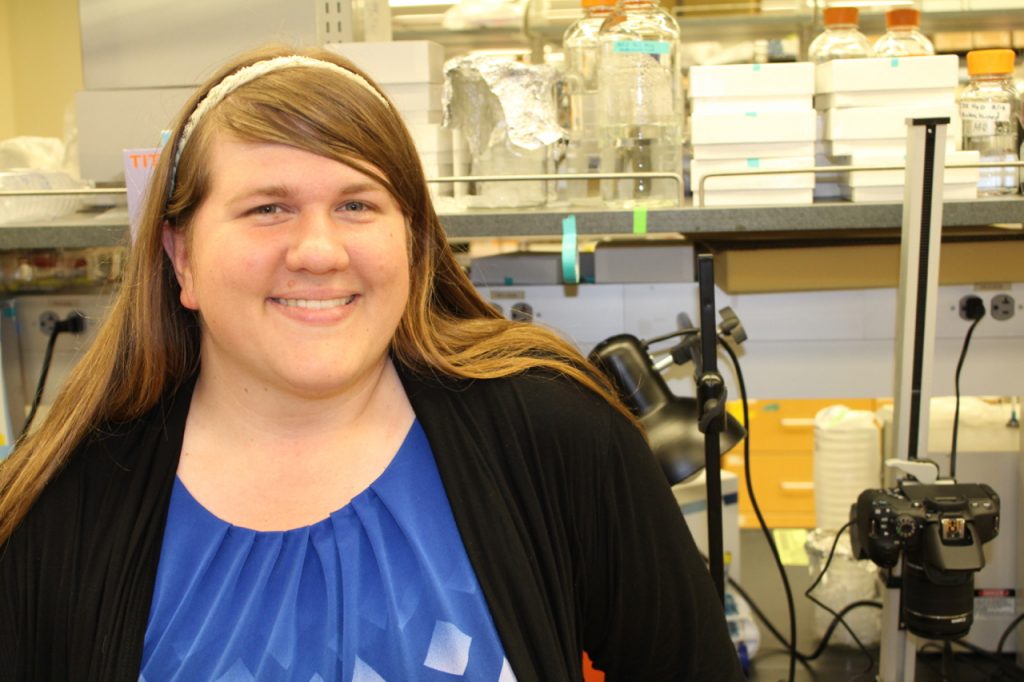We’re taking time over the following weeks to get to know the members of the GSA’s Early Career Scientist Committees. Join us every week to learn more about our early career scientist advocates.
Tiffany Baiocchi
Diversity Subcommittee
University of California Riverside
Research interest
The grubs that chew at the roots of your lawn and the bugs that burrow through the veggies in your garden may be pests to you, but they’re often a tasty meal for nematodes. My research focuses on the behavior of these microscopic worms, including how they decide which insects will make a tasty meal—and which ones won’t. Thankfully, these nematodes are beneficial, completely safe to handle, and as such are used as biological control agents in the agricultural industry, as well as in private home gardens for the purpose of eliminating insect pests. And because they’re harmless, they make an excellent parasitic model to study how parasites can manipulate a host’s immune system.
My current project focuses on the behavior of infective juveniles. This is the life stage where the worms navigate through the soil to find, invade and kill an insect host. I want to know how naturally-occurring chemicals affect the ways in which these worms locate healthy new hosts. Knowing that a particular host is unsuitable (i.e. one that has already been parasitized) is important for the worm because the availability of abundant resources is critical for their development and eventual reproduction. I’ve found several chemical odors associated with already-infected hosts, and I am now studying how these odors act as environmental cues to inform the worm’s behavioral decisions.
As a PhD-trained scientist, you have many career options. What career paths interest you the most?
I enjoy offering helpful explanations—especially ones that can help people move from a place of confusion and frustration to one of clarity and excitement. My experiences as both a graduate student researcher and a teaching assistant have been geared towards providing students with the opportunity to learn in an environment where they feel safe and cared for. I want students to be able to learn, make mistakes, and grow from their own personal experiences. The chance to provide this type of environment drives my passion for sharing knowledge. I also have a passion for research-based mentorship; equipping students with real-world skills truly prepares them for their future careers. I believe that a teaching position at a primarily undergraduate institution would fit my interests and strengths while allowing me to continue growing as an educator and a mentor.
In addition to your research, how else do you want to advance the scientific enterprise?
I want to serve as a mentor and to propagate an ideology of being honest with ourselves, our research, and others. In science, there is often a push to make it seem like we have all the answers, which can discourage transparency about the struggles endemic to the doing of science. Realistically, making mistakes and having to re-evaluate concepts and ideas are essential parts of scientific discovery. I want people to explore science in an authentic way; science isn’t always about having all the answers. Instead, it’s an inexhaustible, self-correcting pursuit of the truth.
As a scientist and mentor, I work to help students realize their potential as explorers who can use the process of scientific inquiry to better understand the world around them. I want to play a part in cultivating a diverse, respectful, and open-minded atmosphere and community.
As a leader within the Genetics Society of America, what do you hope to accomplish?
At GSA, I’ll be helping to develop a mentoring initiative. The total body of graduate students is extremely diverse. Each student comes from a unique background: a mix of intersecting experiences, life choices, and circumstances. One goal of this initiative is to create a sense of community—a place for people to be honest and open about their life experiences and interactions within a group of trusted mentors. Most people are relational, and community plays a vital role in our mental health and overall well-being. Beyond this, the scientific community benefits from diversity. Diversity inspires debate, dialogue, and growth. Working with the GSA to provide a welcoming environment for students with a diverse array of life experiences is one way I hope to have a positive and profound effect on the next generation of scientists. Providing mentorship can foster confidence, equip students with new perspectives and knowledge, and can also yield deep, long-lasting professional relationships. In helping to develop mentoring initiatives, I hope to be involved with providing a place where students can feel connected and experience a sense of community while advancing their education and scientific endeavors.
Previous leadership experience
- Science Olympiad Coach, Martin Luther King High School
- Undergraduate Mentor — University of California, Riverside
- Making Excellence Inclusive Participant — University of California, Riverside
Contact
































